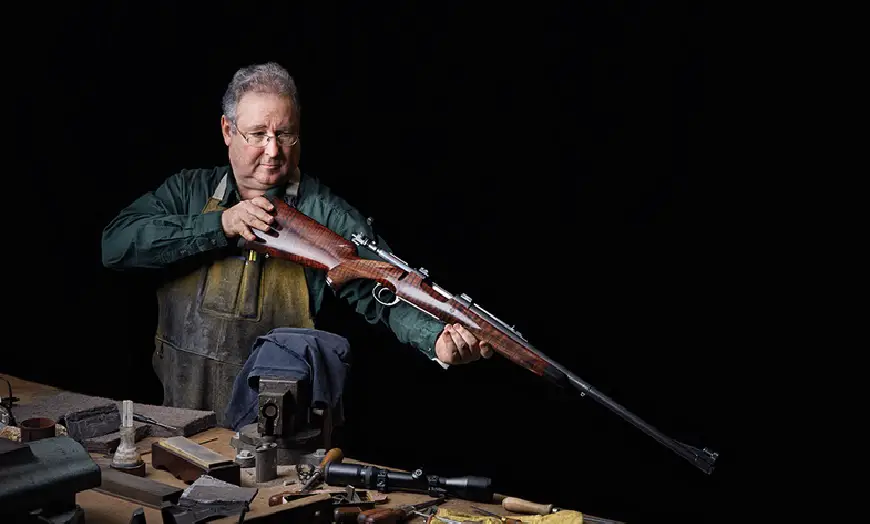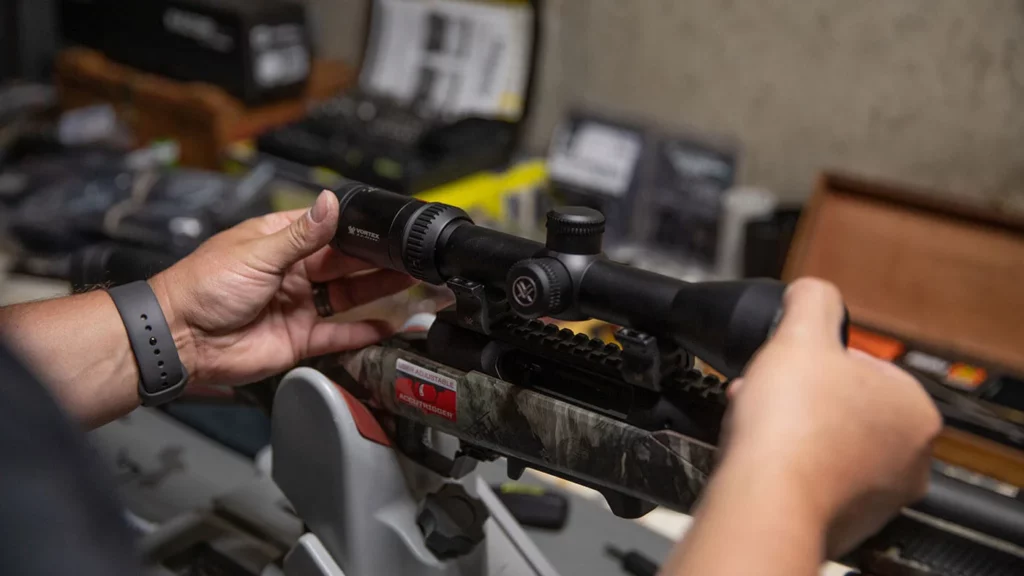Becoming a gunsmith is a strong passion for many people.
Their love for gun collecting or being a gun enthusiast may have ignited their interest.
These people have developed a love for custom guns, for fixing up their own businesses repairing guns, and maintaining guns.
Interestingly enough, they can take their hobby and turn it into a professional career.
A thorough background in woodworking, machining, and metalworking is just what is needed to get started.
Without mastering the art of handling a gun like a professional, one cannot learn how to become a professional gunsmith himself.
What is a Gunsmith?
A professional gunsmith is a skilled professional who specializes in the repair, customization, and maintenance of firearms. Gunsmiths have a deep understanding of the inner workings of various types of firearms and possess the necessary skills to ensure their optimum performance and safety.
They may work in gun shops, gunsmithing shops, or even as independent professionals. Gunsmiths are responsible for examining, diagnosing, and fixing any issues with firearms, including repairing damaged parts, rebluing or refinishing firearms, and customizing firearms according to the preferences of the owner.
They may also specialize in specific types of firearms, such as antique firearms or custom firearms.
Becoming a gunsmith’s job outlook requires a combination of practical experience, formal education, and a passion for firearms. So, if you have a fascination for firearms and enjoy working with your hands, a career in gunsmithing may be the right path for you. How to become a gunsmith?
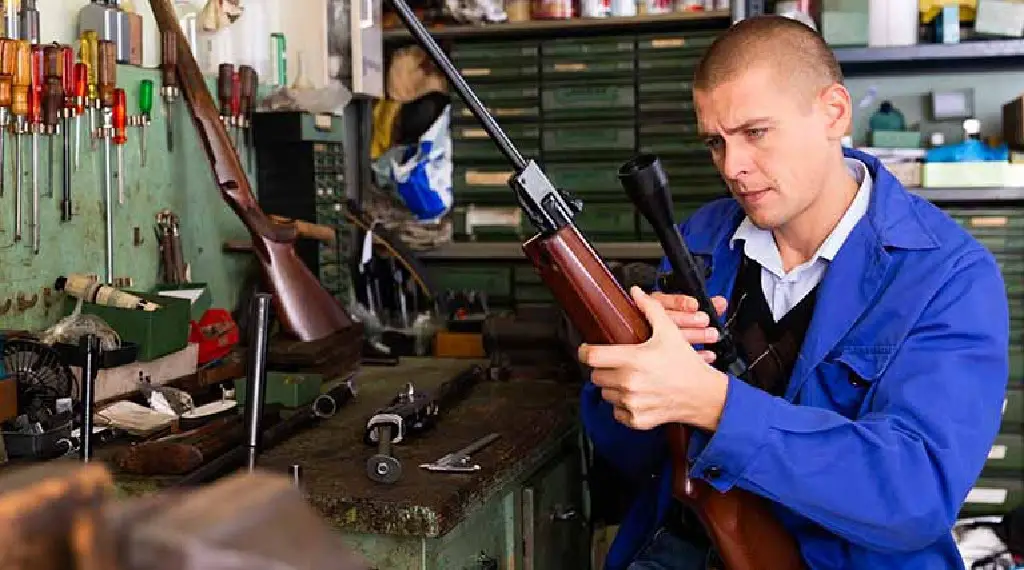
History of the Gunsmith Profession
The history of the gunsmith job outlook profession is a fascinating journey that spans centuries and showcases the evolution of firearm design and craftsmanship.
Dating back to ancient times, gunsmithing has played an integral role in shaping human history and revolutionizing warfare.
The origins of gunsmithing can be traced back to the emergence of firearms in China during the 9th century. The Chinese were among the first to experiment with gunpowder and devise mechanisms to harness its power in combat. These early firearms, known as “fire lances,” consisted of simple tubes filled with gunpowder and a projectile. Gunsmiths of that era were responsible for creating and refining these primitive weapons.
As firearms technology spread across continents, gunsmithing skills began to develop in Europe during the Middle Ages. With the advent of the matchlock mechanism in the 15th century, gunsmiths became highly sought-after craftsmen, specializing in the production and maintenance of firearms for military use.
Their expertise was crucial in ensuring the reliability and functionality of these early firearms.
The 17th and 18th centuries marked a period of significant advancement in firearm design, thanks in large part to the craftsmanship of skilled gunsmiths.
The introduction of flintlock and later, percussion lock systems, provided more reliable and efficient ignition mechanisms. Gunsmiths played a key role in perfecting these new technologies, creating firearms that were more accurate, dependable, and easier to use.
The industrial revolution of the 19th Century brought about further innovations in firearm production. Gunsmiths adapted to these changes, transitioning from hand-crafted firearms to mass-produced ones.
While the demand for highly skilled gunsmiths decreased, those who possessed advanced knowledge and expertise in customizing and repairing firearms continued to thrive.
In today’s modern era, gunsmithing remains an essential profession for firearms enthusiasts and collectors. The skills and knowledge passed down through generations of gunsmiths continue to be vital in preserving and restoring antique firearms.
Additionally, gunsmiths now have access to advanced machinery, tools, and materials, allowing for the creation of custom firearms tailored to the unique preferences and licensing requirements of individual owners of gun manufacturers.
The history of the gunsmith profession is deeply intertwined with the development and evolution of firearms themselves. From the simple fire lances of ancient China to the intricate and specialized firearms of today, gunsmiths have been at the forefront of designing, repairing, and maintaining these powerful tools.
The skill, craftsmanship, and mechanical expertise, of gunsmiths throughout history have left an enduring legacy, shaping the world of firearms as we know it today.
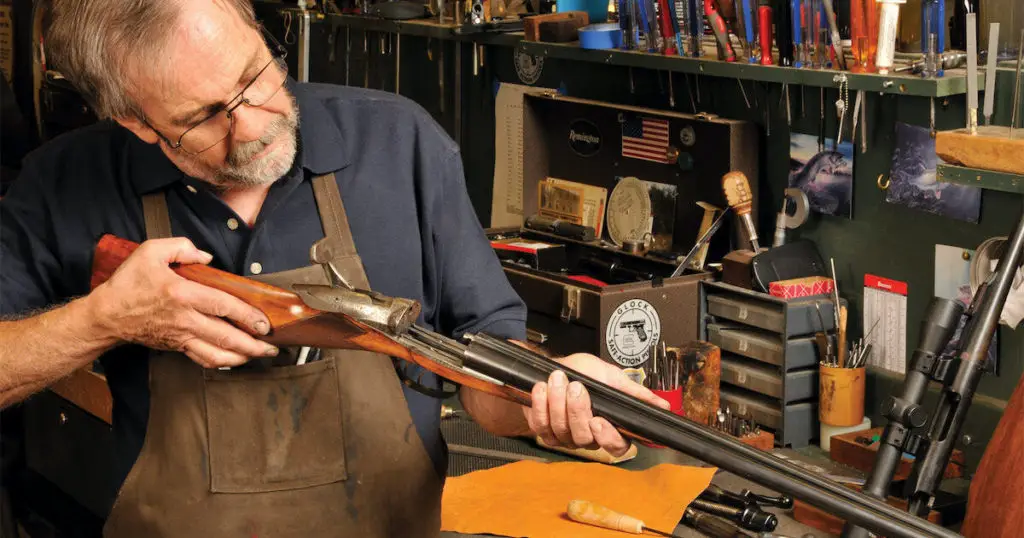
What does a gunsmith do?
Exact responsibilities may vary, but common tasks for a gunsmith include:
- Build, modify or repair guns to a client’s specifications
- Clean guns
- Customize guns, such as through gun engraving
- Disassemble and assemble custom guns for repair and cleaning
- Inspect weapons to identify problems
- Maintain inventory of weapons and accessories
- Meet with clients to discuss their needs
- Repair and sell guns
How to become a gunsmith?
Career Path Options
When it comes to pursuing a career in gunsmithing, aspiring professionals have several path options to choose from. Whether you prefer a formal education or hands-on experience, there is a how to become a gunsmith and career path that can suit your interests and goals.
- 1. Formal Education: Many gunsmiths begin their careers by obtaining a formal education through community colleges, technical schools, or specialized gunsmithing programs. These programs typically offer a comprehensive curriculum for gunsmith programs that covers a wide range of topics, such as firearm design and function, gun safety, repairing and customizing firearms, and the history of weapons. By earning a certificate or associate degree in gunsmithing, individuals can gain a solid foundation of knowledge and skills that will enhance their career prospects.
- 2. Apprenticeship Program: For those who prefer a more hands-on approach, apprenticeship programs can provide valuable practical experience.
- 3. Independent Gunsmith: Some individuals choose to pursue a career as an independent gunsmith, establishing their own gunsmith shop or offering mobile gunsmithing services. While this path may not require formal education, it does require a deep understanding of firearms and exceptional problem-solving skills. Independent gunsmiths often build a client base through word-of-mouth referrals or by partnering with local other gunsmiths who specialize in shops or shooting ranges that sell firearms themselves. This career path allows for more flexibility and the opportunity to specialize in certain types of firearms or custom gun work.
- 4. Continuing Education: No matter which path you choose, it’s essential to continuously pursue further education and stay updated on the latest advancements in firearm technology. Attending gunsmithing courses or workshops, participating in professional national rifle associations, trade schools, or organizations, and networking with other gunsmiths can help foster professional growth and enhance job opportunities. Additionally, staying informed about industry trends and developments ensures that gunsmiths can provide their customers with the highest quality service and expertise.
The gunsmithing profession offers a variety of career path options, allowing individuals to find the best fit for their skills, interests, and goals.
Whether you choose formal education, apprenticeships, independence, or ongoing education, a career in gunsmithing offers the opportunity to combine a passion for firearms with technical skills and creativity.
With dedication and commitment, aspiring gunsmiths can carve out successful careers in this specialized field. But if you want to become a medical assistant, the steps to this profession can be read here.
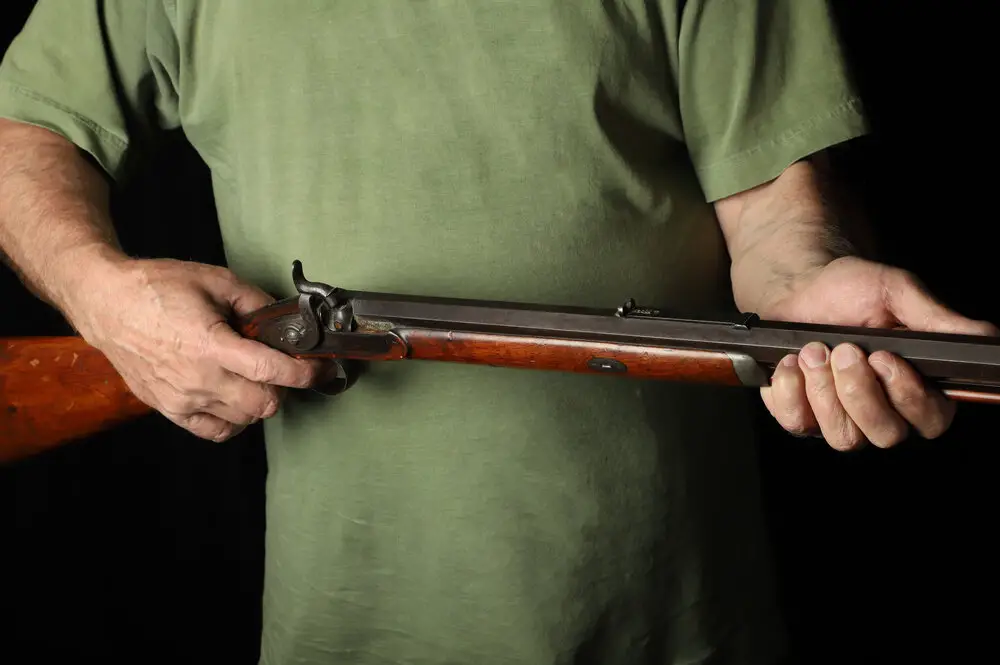
Education Requirements for Becoming a Gunsmith
When it comes to pursuing a career as a gunsmith, having the right education is crucial. While some individuals may learn the craft through hands-on experience or an apprenticeship, formal education can provide a solid foundation of knowledge and skills that will set aspiring gunsmiths apart.
Here are the education requirements for becoming a gunsmith:
- 1. Community College or Technical School: Many gunsmiths begin their own gunsmithing school or program journey by enrolling in a gunsmithing program at a community college or technical school. These programs typically offer a comprehensive curriculum that covers a wide range of topics, including firearm design and function, gun safety, repairing and customizing firearms, and the history of weapons. By earning a certificate or associate degree in gunsmithing, individuals can gain a well-rounded education that prepares them for a successful career in the field.
- 2. Specialized Gunsmithing Programs: In addition to community colleges and technical schools, there are specialized become gunsmiths available that focus solely on firearms. These programs provide in-depth training and instruction specifically tailored to the art of gunsmithing. Students can expect to learn essential skills such as firearm disassembly and assembly, troubleshooting, custom gun work, and various firearms and repair techniques. These specialized programs often offer hands-on experience and practical training to ensure students are well-prepared for the demands of the profession.
- 3. Apprenticeship Opportunities: For those who prefer a more hands-on approach to learning, apprenticeship programs can be a valuable option. These programs allow aspiring gunsmiths to work alongside experienced professionals in a gunsmith shop or firearms repair facility. Through hands-on training and mentorship, apprentices learn the practical skills needed to succeed in the field, such as diagnosing and fixing firearm issues, customizing and repairing guns, and providing exceptional customer service. Apprenticeships offer a unique opportunity to learn directly from experienced gunsmiths while gaining practical experience in a professional setting.
- 4. Continuing Education and Professional Development: The world of guns and firearms is constantly evolving, with new technologies and advancements being introduced regularly. Aspiring gunsmiths must stay informed and up to date on these developments to provide their customers with the highest quality service and expertise. That’s why continuing education is essential for gunsmiths. By continually learning and improving their skills, gunsmiths can stay ahead in a competitive field.
In conclusion, education requirements for becoming a gunsmith can vary, but formal education through local community colleges, colleges, technical schools, or specialized gunsmith programs can provide a strong foundation of knowledge and skills.
Apprenticeship programs also offer valuable hands-on experience under the guidance of experienced professionals.
Continual learning and professional development are crucial for success in the field. By staying informed and up-to-date, gunsmiths can provide top-notch service and remain competitive in a constantly evolving industry.
Certificate Programs and Courses in Gunsmithing
Certificate programs and courses in gunsmithing provide a great opportunity for individuals passionate about firearms and interested in pursuing a career in this field. These programs offer a shorter duration of study while still equipping students with the essential skills and knowledge required for a federal firearms license.
Focused on the practical aspects of the profession, certificate programs in gunsmithing aim to provide a comprehensive education. They cover various topics such as firearm design and function, troubleshooting and repair, stock making, gun engraving, and customization techniques. Students gain in-depth knowledge about different types of firearms and learn how to effectively work with them, understanding their intricacies.
Certificate programs offer flexibility as one of their advantages. They are frequently provided by community local community colleges, technical schools, or other educational institutions that cater to individuals who are working adults or unable to commit to a full-time degree program.
Compared to degree programs, many certificate programs can be completed in a shorter period of time, enabling students to fast-track their education and start working earlier.
A key component in both certificate programs and certificate courses is practical hands-on experience. These programs and courses offer individuals the chance to gain specific skills or knowledge in a particular area of gunsmithing.
The duration of these courses is typically shorter, and they focus on specialized topics like gunstock checkering, metal engraving, or firearms refinishing. By participating in these programs or courses, individuals can develop expertise in a specific aspect of gunsmithing and improve their overall skillset.
Under the guidance of experienced instructors, students in these programs and courses are often given the opportunity to work with firearms in well-equipped workshops. This hands-on experience allows students to gain confidence in their abilities and improve their skills, preparing them for successful careers in the future.
In addition to teaching gunsmithing techniques, certificate programs, and courses also place a strong emphasis on the importance of gun safety and responsible firearm ownership. Students learn proper handling, storage, and maintenance techniques to ensure the safety of themselves and others. This focus on safety is essential because gunsmiths frequently interact with firearms and gun owners. It is crucial for gunsmiths to instill a sense of responsibility and safety in their clients.
When it comes to certificate programs or courses in gunsmithing, it is crucial to thoroughly investigate and select reputable institutions or programs. It is advisable to seek out accredited programs with a proven track record of producing successful gunsmiths. Furthermore, it is important to consider your specific area of interest within gunsmithing and find programs that specialize in that particular field.
By completing a certificate program or course in gunsmithing, individuals can open up a wide range of job opportunities. They may secure employment in firearms license gunsmiths, shops, or firearm gun manufacturers, or even establish their own independent firearms federal firearms license or gunsmithing business. The specialized skills and knowledge acquired through these programs make graduates highly sought after in the industry.
Consider pursuing a certificate program or course in gunsmithing to kickstart your career if you have a passion for firearms and a desire to work with them. These programs provide the opportunity to develop expertise and job prospects in the field of gunsmithing, whether you are looking to enhance your existing skills or start a new career.
In conclusion, certificate and associate degree programs, and courses in gunsmithing offer a focused and efficient way to gain essential skills and knowledge in the field.
Apprenticeship Programs and Practical Experience

Apprenticeship programs and practical experience play a crucial role in the journey of becoming a skilled and experienced gunsmith. While federal firearms licenses and courses offer a strong foundation of knowledge, apprenticeships provide the opportunity to apply that knowledge in real-world situations and learn from experienced professionals in the field.
An apprenticeship program is a hands-on training experience where aspiring and firearms license gunsmiths work under the guidance and supervision of a seasoned and federal firearms license gunsmith.
This on-the-job training allows individuals to learn the practical skills and necessary training for the profession, acquire skills such as firearm repair, maintenance, customization, and even business management.
During an apprenticeship, gunsmithing students have the chance to work directly with customers, handle different types of firearms, and troubleshoot and repair guns with various issues.
This practical experience is invaluable as it exposes apprentices to various scenarios and challenges, helping them develop problem-solving skills and gain confidence in their abilities.
Apprenticeships typically last for an extended period, ranging from a few months to several years, depending on the program and individual circumstances. This duration allows apprentices to truly immerse themselves in the field and develop a deep understanding of the intricacies of different firearm types and models.
One of the significant advantages of apprenticing is the opportunity to learn from experienced professionals who have spent years honing their skills.
These mentors can share their expertise, techniques, and industry insights, helping apprentices refine their craft and avoid common pitfalls of professional organization. The mentor-apprentice relationship fosters a supportive and collaborative learning environment, where questions can be asked, mistakes can be made, and valuable knowledge can be passed down.
In addition to the practical skills acquired during an apprenticeship, this form of training also offers networking opportunities.
Working alongside established gunsmiths allows apprentices to establish connections within the industry, which can prove invaluable when seeking future employment or starting their own gunsmithing business. These connections can lead to job recommendations, client referrals, or even partnerships with other gunsmiths.
It is important to note that apprenticeship programs are often competitive and selective. Gunsmiths or gunsmithing organizations offering apprenticeships typically have specific criteria and requirements for the acceptance of prospective students into their programs. These may include previous experience or education in gunsmithing, a strong work ethic, and a genuine passion for firearms.
Overall, apprenticeship programs provide a unique and immersive learning experience that complements formal education in gunsmithing. The combination of theoretical knowledge gained through federal firearms licenses, courses, or degree programs, along with the practical skills acquired through apprenticeships, creates a well-rounded and competent gunsmith.
By investing time and effort into apprenticeship programs and gaining practical experience, aspiring gunsmiths can significantly enhance their career prospects and become skilled professionals in the field.
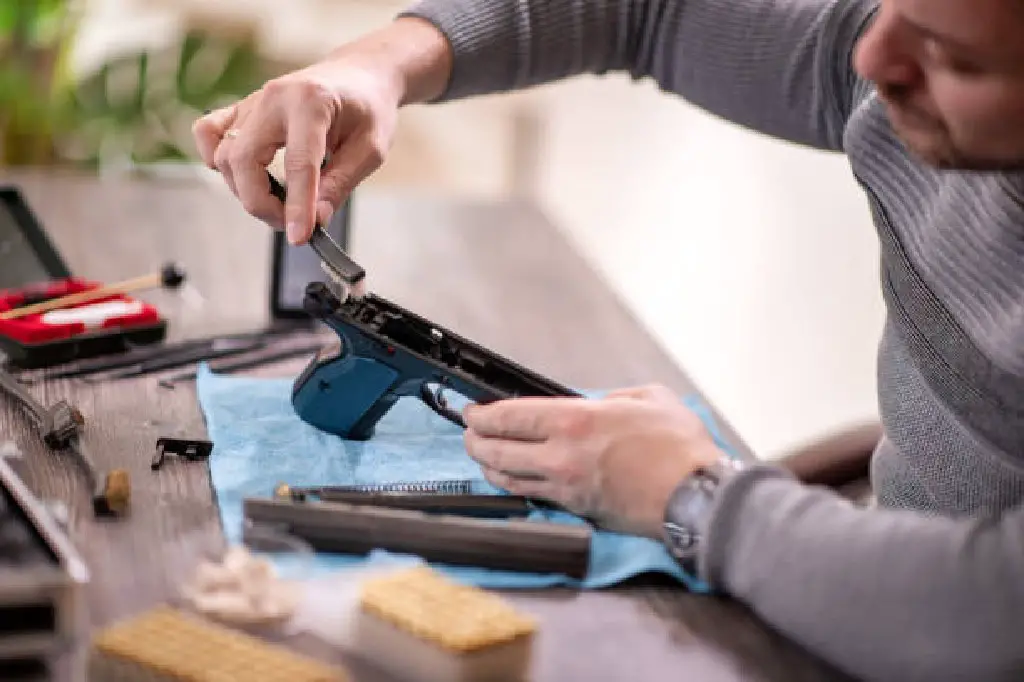
Hands-on Experience and Basic Skills Training
Hands-on experience and skills training are crucial components of becoming a skilled gunsmith. While formal education in gunsmithing can provide a strong foundation of theoretical knowledge, it is through practical, hands-on experience and basic math skills that aspiring gunsmiths truly develop their skills and proficiency.
Hands-on experience allows individuals to directly work with firearms and gain a deep understanding of their components, mechanisms, and functionality.
By handling different types of firearms and performing repairs, maintenance, and customization tasks, gunsmithing students can familiarize themselves with the intricacies and nuances of various firearm models. This exposure to real-world scenarios and challenges helps them develop problem-solving skills, adaptability, and critical thinking abilities.
Basic skills training is an essential aspect of becoming a gunsmith.
These skills encompass a range of fundamental techniques and tasks that are the building blocks of the profession. Some of these skills include disassembling and reassembling firearms, identifying and fixing common issues, refinishing and bluing, stock work, barrel fitting, and basic metalworking.
Having a solid foundation of skills is crucial for any gunsmith as it enables them to effectively troubleshoot problems, carry out repairs, and provide quality craftsmanship.
It is during this training that students learn the safe and correct use of various hand tools, power tools, and machinery commonly used in the trade high and trade high school diploma in gunsmithing. They also develop an understanding of different firearms and their specific requirements.
There are several ways to obtain hands-on experience and skills training in gunsmithing. One option is to enroll in a gunsmith and manufacturer offered by an accredited high school diploma, technical college, or community local community college. These become gunsmith programs often combine classroom instruction with hands-on lab sessions where students can practice their skills under the guidance of experienced instructors.
Another option is to seek out apprenticeship programs or opportunities to work in other gunsmiths, shops, or gunsmithing establishments.
These environments provide invaluable hands-on experience, allowing individuals to learn from seasoned professionals and gain practical skills through on-the-job training. By acquiring the skills of owning even melee weapons, you will become an invaluable employee. By working alongside experienced gunsmiths, apprentices can learn advanced techniques, gain exposure to specialized areas of gunsmithing, and understand the inner workings of a gunsmithing business.
How to become a gunsmith ultimately, hands-on experience and skills training are essential for aspiring gunsmiths to become proficient in their craft. These experiences not only provide a solid foundation of practical knowledge but also instill the necessary skills and confidence to succeed in the dynamic and diverse field of gunsmithing.
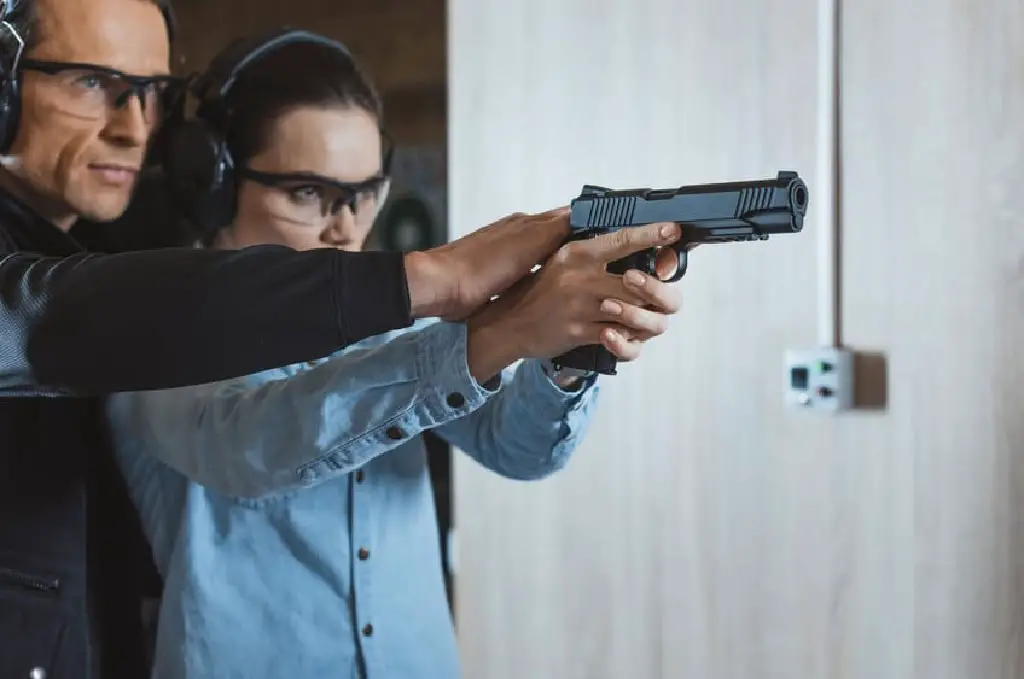
Gunsmith Salary
The national rifle association’s average salary for a gunsmith is $35,750 per year.
It’s important to remember that exact salaries may vary. For example, factors like your employer, geographic location, experience, and qualifications may affect how much you earn.
Do gunsmiths make a lot of money?
Gunsmiths in the US can earn higher salaries depending on where they live. For example, a firearmsmith in New York would be paid $855,000, and a firearmsmith in states like Texas Pennsylvania, and Montana would earn $651,000 to $99.9.
What degree do you need for a gunsmith?
Typically, the easiest option to learn gunsmithing is obtaining a professional qualification. You can also earn an associate degree, but it may take more core courses in liberal arts to obtain a degree at university.
Is gunsmithing a good career?
These gun ownership jobs are ideal if they possess excellent customer service skills and are passionate about discussing a wide selection of firearms. If a gunsmith wants the ability to take his own business over as his own business manager, it is an option.
How many years is gunsmithing?
The following year was the first.
Is There An Age Requirement To Be A Gunsmith?
To actually do any work as a gun manufacturer, you will need to be 21 years of age. However, you can begin your studies at 18, as this career does require it.
Do I Need A Federal Firearms License?
To actually do any work as a gun manufacturer, you will need to be 21 years of age. However, you can begin your studies at 18, as this career does require it.
Can I Be A Gunsmith If I Am A Convicted Felon?
No, convicted felons will not be able to become a gunsmith.
